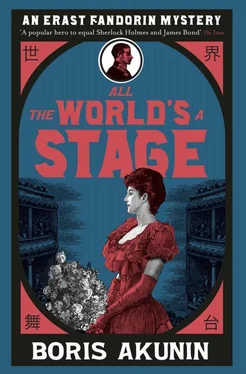He looked at himself in the mirror that happened to be conveniently located close by and felt happy with his appearance. There had never been an occasion when the ladies remained indifferent to the way he looked – especially if he wished to please.
Erast Petrovich walked up to her and cleared his throat delicately. When she looked round, he said gently:
‘You shouldn’t have got upset. You only gave that wicked-tongued lady more satisfaction.’
‘But how could she dare?’ Eliza exclaimed piteously. ‘To suggest that I…’
She shuddered in revulsion.
Keenly aware of how close she was standing – a mere arm’s length away – Fandorin continued with a subtle smile.
‘Women of the mentality of Madam Vulpinova simply cannot exist without an atmosphere of scandal. You must not allow her to draw you into her games. This psychological personality type is called a “scorpion”. Essentially they are unhappy, very lonely people…’
The beginning of the conversation had gone well. Firstly, he had managed not to stammer even once. Secondly, Elizaveta was bound to ask about psychological types, and then Fandorin would have a chance to encourage her interest in him.
‘Ah, I do believe that is right!’ Altairsky-Lointaine said in surprise. ‘Xanthippe does seem to be broken inside somehow. She plays mean tricks, but there is something pitiful and supplicating in her eyes. You are an observant individual, Mr…’ She hesitated.
‘Fandorin,’ he reminded her,
‘Yes, yes, Mr Fandorin. Stern said that you are a connoisseur of modern literature, but you are not simply a repertoire manager, are you? One can sense a certain… specialness about you.’ It took her a moment to find the word, but it caught Erast Petrovich’s fancy. And what he liked even more was the enchanting smile that appeared on her face. ‘You have such a good understanding of people. You must write theatre reviews, do you not? Who are you?’
After thinking for a moment, he replied:
‘I… am a traveller. But unfortunately, I don’t write reviews.’
The smile faded away, together with the interest that he had read in her magically elusive gaze.
‘They say it is fascinating to travel. But I have never understood the pleasure in constantly moving from one place to another.’
The eloquent glance that she cast at the pink folder could mean only one thing: leave me in peace, this conversation is over.
But Erast Petrovich did not want to leave. He had to tell her something to make her realise that their meeting was not accidental, that this was some incomprehensible but incontrovertible scheme of destiny.
‘Eliza… Pardon me, I don’t know your patronymic.’
‘I don’t acknowledge patronymics.’ She picked up the text. ‘They exude an odour of stagnation and barbarity. As if you were your procreator’s property. But I belong only to myself. You may call me simply Eliza. Or, if you wish, Elizaveta.’
Her tone of voice was indifferent, even rather cold, but Fandorin became even more agitated.
‘Precisely, you are Elizaveta, Liza. And I am Erast! D-do you understand?’ he exclaimed with an impulsiveness that he had never suspected in himself, and also, stammering quite excessively. ‘I saw the finger of fate in that… that g-gesture of yours with your arm outstretched… And in S-September too…’
He hesitated, seeing that she didn’t understand a thing. No reciprocal stirring of the soul, no reaction at all apart from slight puzzlement. But there was nothing surprising in that. What meaning did Erast have for her, or September, or a white arm?
He clenched his teeth. The last thing he needed was for Liza, that is, Eliza, to take him for a madman or an overexcited admirer. She was already surrounded by more than enough of both of those, without Fandorin.
‘I meant to say that I was astounded by your performance yesterday,’ he said in a more composed manner, trying all the time to catch her elusive glance and hold it. ‘I have never experienced anything like it before. And of course, the coincidence of the names shook me. I am called Erast, you see. Petrovich…’
‘Ah, yes indeed. Erast and Liza.’ She smiled again, but distractedly, without even a trace of warmth. ‘What’s all that howling? They’re squabbling again…’
He looked round in annoyance. Someone really was shouting upstairs. Fandorin recognised the director’s voice: ‘Blasphemy! Sacrilege! Who did this?’ – the voice was coming from the direction of the green room.
‘I have to go. Noah Noaevich has come back and he seems to be angry about something.’
Erast Petrovich followed Eliza with his head bowed, cursing himself for flunking the first conversation. Never once since the days of his early youth had he behaved so idiotically with a woman.
‘I want to know who did this!’
Noah Noaevich, looking enraged, was standing at the door of the sitting room (sometimes the green room was referred to in that way) holding the ‘Tablets’ open in his hands.
‘Who dared to do this?’
Fandorin glanced into the open book. Immediately below the solemn entry about Independence Day, someone had scribbled in large, crooked letters, using a purple indelible pencil: ‘EIGHT 1S UNTIL THE BENEFIT PERFORMANCE. TAKE THOUGHT!’
Everyone came up to look and was left puzzled.
‘The theatre is a temple! The actor’s ministry is an exalted mission! We cannot survive without reverence and our sacred objects!’ Stern exclaimed, almost in tears. ‘Whoever did this wished to insult me, all of us and our art! What sort of scribble is this? What does it mean? How many times do I have to repeat that in my theatre there are no benefit performances and there never will be? That’s the first point. And the second point is that desecrating our sacred object is the same as defiling a church! Only a vandal could do such a thing!’
Some of them listened to him with sympathy, some shared his indignation, but snickering could also be heard.
‘Go away, all of you,’ the director said in a weak voice. ‘I don’t want to see anyone… It’s impossible to work today. Tomorrow, tomorrow…’
Fandorin took advantage of the fact that everyone was looking at the suffering martyr to keep his own eyes fixed on Eliza. She seemed to him unattainably distant, truly the star Altair, and that thought was painful.
He realised that something would have to be done about this pain, it would not pass off on its own.
THERE ARE NO PROBLEMS THAT CANNOT BE SOLVED
For the second night in a row Erast Petrovich was unable to get to sleep. And, moreover, his thoughts were by no means occupied with deductive reasoning concerning the snake in the flower basket. The internal condition of the harmonious man had skipped through several consecutive stages at once.
At the first stage a simple truth had been revealed to Fandorin, one that a less intelligent and complex individual would have grasped much sooner. (However, we must make allowances for the fact that Erast Petrovich had considered this page of his life to have been read and closed for ever a long time ago.)
I’m in love , he suddenly told himself, this fifty-five-year-old man who had seen and experienced so many things of every possible kind in the course of his life. He was incredibly surprised and even burst into laughter in the silence of the empty room. There can be no doubt, unfortunately – so I’m in love, then? In love, like a boy, filled with youthful passion? Ah, what nonsense! How shamefully absurd, how positively vulgar! To burn one’s heart out by the age of twenty-two, then live for a third of a century with the feebly glowing ashes, dauntlessly enduring the crushing blows of fate and maintaining one’s cold reasoning even in situations of deadly danger; to attain spiritual peace and clarity at an age that is not yet old – and then lapse back into puerility, to find oneself in the laughable position of someone in love!
Читать дальше









